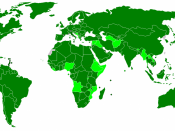Executive Summary
This article discusses the concept of coercive capacity of sovereign nation-states and its influence on international business environment according to Krasner's and Schmidt's researches. It indicates that coercive capacity can be defined in three different dimensions: state-to-state, state-to-MNCs and state-to-supranational economic organizations and then explains how coercive capacity of nation-states affects in the three different levels.
What is the coercive capacity of nation-states?
The coercive capacity of nation-states can be defined as the ability that influential sovereign nation-states impose great pressures on other objects in order to gain much more interests. Simultaneously, "other objects", according to Krasner and Schmidt, comprise states Krasner, 1995()�, multinational corporations (MNCs) and supranational economic organizations Schmidt, 1995()�, all of which constitute the international business environment.
How the coercive capacity of sovereign nation-states affect international business environment?
As discussed above, the embodiments of coercive capacity of nation-states can be summarized in three aspects: state-to-state coercion, state-to-MNC coercion and state-to-supranational organization coercion.
State to State
According to Krasner's description Krasner, 1995()� , "coercion occurs when one powerful state threatens to impose sanctions unless their counterparts in another compromise their domestic autonomy", which implies that power asymmetry between states entails the coercion. In the area of international business, the most significant coercion is economic sanctions Krasner, 1995()�, when a powerful state attempts to use economic sanctions to affect a weak state's domestic institutions, policies or personnel for the purpose of gaining economic or political interests. Take, the economic sanctions placed on Iran by the United States, for example. Since the US wanted to control oil outlets in the world in favor of its huge domestic oil consumption, the US has paid extraordinary attention to states that possess large amount of oil, one of which is Iran. However, the Iran government adopts a policy...


